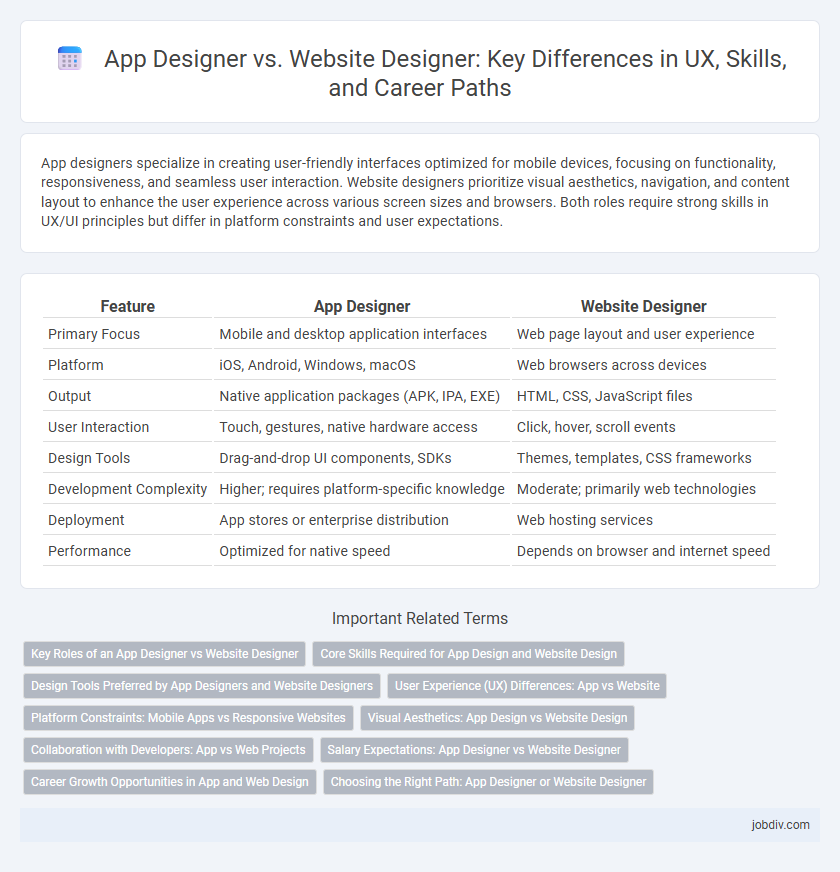App designers specialize in creating user-friendly interfaces optimized for mobile devices, focusing on functionality, responsiveness, and seamless user interaction. Website designers prioritize visual aesthetics, navigation, and content layout to enhance the user experience across various screen sizes and browsers. Both roles require strong skills in UX/UI principles but differ in platform constraints and user expectations.
Table of Comparison
| Feature | App Designer | Website Designer |
|---|---|---|
| Primary Focus | Mobile and desktop application interfaces | Web page layout and user experience |
| Platform | iOS, Android, Windows, macOS | Web browsers across devices |
| Output | Native application packages (APK, IPA, EXE) | HTML, CSS, JavaScript files |
| User Interaction | Touch, gestures, native hardware access | Click, hover, scroll events |
| Design Tools | Drag-and-drop UI components, SDKs | Themes, templates, CSS frameworks |
| Development Complexity | Higher; requires platform-specific knowledge | Moderate; primarily web technologies |
| Deployment | App stores or enterprise distribution | Web hosting services |
| Performance | Optimized for native speed | Depends on browser and internet speed |
Key Roles of an App Designer vs Website Designer
App Designers specialize in creating intuitive, user-friendly mobile interfaces optimized for touchscreen interactions and diverse device capabilities, prioritizing responsive layouts and seamless navigation within app ecosystems. Website Designers focus on developing visually appealing, accessible, and SEO-friendly web pages, ensuring compatibility across browsers and devices while emphasizing user experience and content hierarchy. Both roles require proficiency in design tools, user interface (UI) principles, and user experience (UX) strategies tailored to their respective platforms.
Core Skills Required for App Design and Website Design
App designers require proficiency in mobile platforms such as iOS and Android, strong knowledge of user interface (UI) and user experience (UX) principles tailored for smaller screens, and expertise in prototyping tools like Sketch or Figma. Website designers must master responsive web design, HTML, CSS, JavaScript, and a deep understanding of web accessibility standards to create intuitive, functional layouts across devices. Both roles demand creativity, attention to detail, and collaboration skills but differ significantly in technical tools and platform-specific knowledge.
Design Tools Preferred by App Designers and Website Designers
App designers frequently use tools like Sketch, Figma, and Adobe XD for their robust prototyping capabilities and mobile-focused features. Website designers often prefer Adobe Photoshop, Illustrator, and Webflow, as these tools excel in visual design and responsive web development. Both disciplines value user experience and interface design but prioritize different software tailored to their platform-specific requirements.
User Experience (UX) Differences: App vs Website
App designers prioritize intuitive navigation and seamless performance tailored for mobile devices, ensuring fast load times and offline capabilities that enhance user engagement. Website designers focus on responsiveness and accessibility across diverse screen sizes and browsers, optimizing content layout and interactive elements for varying internet speeds. Both roles emphasize user-centric design, but app UX demands deeper integration with device-specific features like gestures and notifications.
Platform Constraints: Mobile Apps vs Responsive Websites
Platform constraints for app designers revolve around mobile operating systems like iOS and Android, requiring adherence to specific SDKs, screen sizes, and hardware capabilities. Website designers focus on creating responsive websites that adapt seamlessly to various devices and browsers using flexible grids, CSS media queries, and scalable images. Mobile apps offer optimized performance and offline capabilities, while responsive websites provide broader accessibility without installation, impacting design decisions related to user experience and resource management.
Visual Aesthetics: App Design vs Website Design
App design prioritizes streamlined visual aesthetics to ensure clarity and usability on smaller screens, emphasizing touch-friendly elements and minimalistic interfaces. Website design incorporates more flexible layouts and richer visuals to accommodate diverse screen sizes and user interactions, often utilizing advanced CSS and animations for enhanced engagement. Both require a strong understanding of color theory, typography, and responsive design principles to create visually appealing experiences optimized for their respective platforms.
Collaboration with Developers: App vs Web Projects
App designers collaborate closely with developers to ensure seamless integration of user interfaces with complex mobile functionalities, often utilizing platform-specific development tools like Swift or Kotlin. Website designers work alongside developers to optimize responsiveness and cross-browser compatibility, frequently leveraging HTML, CSS, and JavaScript frameworks to meet diverse user needs. Effective collaboration in both fields relies on clear communication and shared understanding of project goals, deadlines, and technical constraints to deliver polished, functional digital products.
Salary Expectations: App Designer vs Website Designer
App Designers typically command higher salary expectations, with average annual earnings ranging from $85,000 to $120,000, driven by the specialized skills in mobile platforms and user experience optimization. Website Designers usually earn between $60,000 and $95,000 annually, reflecting the demand for web design expertise coupled with front-end development knowledge. Salary variations depend on experience, location, and proficiency in tools like Figma, Sketch for designers, and coding languages such as Swift or JavaScript for app development.
Career Growth Opportunities in App and Web Design
Career growth opportunities in app design often feature specialization in mobile user experience, proficiency in iOS and Android platforms, and the ability to integrate emerging technologies like AR and AI, enhancing market demand. Website designers experience growth by mastering responsive design, SEO optimization, and front-end development frameworks, supporting diverse industries from e-commerce to digital marketing. Both fields require continuous skill upgrading, but app design careers tend to offer higher salary potential due to the growing mobile app market and innovation drivers.
Choosing the Right Path: App Designer or Website Designer
Choosing between an app designer and a website designer depends on the target platform and user experience goals. App designers specialize in creating responsive, user-friendly interfaces optimized for mobile devices and specific operating systems, ensuring seamless functionality and performance. Website designers focus on building accessible, visually appealing sites that adapt to various screen sizes and browsers, emphasizing SEO and cross-platform compatibility.
App Designer vs Website Designer Infographic

 jobdiv.com
jobdiv.com